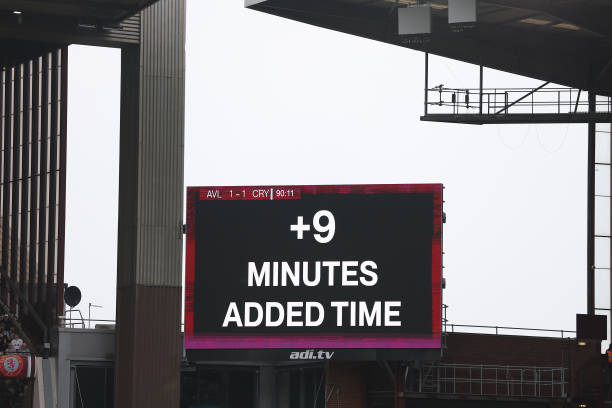Added time has been a contentious subject in football for years. Despite advances in technology, the process for determining stoppage time remains vague and inconsistent, frustrating fans and players alike. Recently, a passionate post by Reddit user GoBlueScrewOSU7 reignited the debate, questioning the accuracy and fairness of stoppage time. The conversation gained further traction following a controversial Football Kenya Federation Premier League (FKF PL) recent match.
GoBlueScrewOSU7’s frustration stemmed from what they saw as inconsistencies in stoppage time calculations. Recalling a USA vs. Belgium match from the 2014 World Cup, the user complained, “I timed every second the ball wasn’t in play and got 2 minutes and 32 seconds. Yet the referee allowed only 1 minute of added time?” This discrepancy is common in matches worldwide, with referees given wide discretion in determining how much time is added, often leading to heated debates.
A particularly explosive incident in Kenya brought the issue to the forefront. In a tense FKF PL match between Shabana FC and Ulinzi Stars, Peter Glen of Ulinzi scored a late equalizer in stoppage time. Fans of Shabana FC erupted in anger, accusing the referee of allowing play to continue past the five minutes of added time allocated. The situation escalated into chaos, with vandalism at the Ulinzi Sports Complex. As punishment, Shabana FC was banned from hosting fans for five home games. The fans didn’t just feel they had lost a point—they felt cheated by poor time management.
The subject of added time isn’t limited to Kenyan football. Football fans across leagues regularly question why added time seems arbitrary. In the English Premier League, Arsenal fans recently voiced similar frustrations after Erling Haaland of Manchester City scored deep into stoppage time to secure a victory. Critics questioned whether the added minutes were justified, reigniting the conversation about how referees calculate stoppage time.
Reddit user Estiferous weighed in on the discussion, highlighting the unclear nature of “time-wasting” in football’s Laws of the Game. Whether it’s a goalkeeper holding the ball for too long or players walking slowly during substitutions, there are no universal standards for what warrants adding extra time. This leaves referees to make subjective calls, which can vary drastically depending on the match and the official involved.
Some fans, like Reddit user Romareda, take a more balanced view. “It tends to average out over time,” Romareda noted, “Sometimes you feel cheated, and sometimes you benefit.” However, this doesn’t address the immediate frustration fans feel when their team loses points due to what seems like arbitrary time management.
Suggestions for reform are growing louder. GoBlueScrewOSU7 proposed that a neutral timekeeper could manage stoppage time, using a stopwatch to track time lost during substitutions, injuries, or goal celebrations. This system, already in use in sports like rugby, would provide more transparency and fairness.
However, not everyone is on board with such changes. Traditionalists argue that football’s charm lies in its unpredictability, and adding more rigid timekeeping rules would detract from the flow of the game. “Football just isn’t a black-and-white game,” Romareda added, suggesting that too much structure could take the fun out of the sport.





